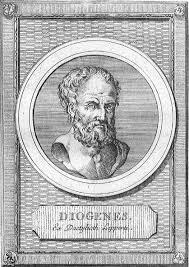
DIOGHENES HO BABYLONIOS is head of the Stoic school in Athens, and he is one of the three philosophers who go to Rome in 155 BC.
He writes many works, but none of his writings survives, except as quotations by later writers. Marcus Tullius Cicero calls Dioghenes “a great and important Stoic”. He is also in the writings of the Epicurean philosopher Philodemos (Philodemus of Gadara). These works appear in the papyrus rolls among the ruins of the Villa of the Papyri at Herculaneum, There, Dioghenes ho Babylonios emerges more frequently than any other philosopher besides Epicurus himself. This proves, with other corroborations, that Dioghenes ho Babylonios is head of the Stoic school in Athens.
He is the author of several works, of which, unfortunately, we know little more than the titles. We can mention “Dialektike Techne” (“Dialectic Art“), “Peri tou tes psyches hēgemonikou” (“On the ruling faculty of the soul“). Furtermore we know of “Peri phones” (“On speaking“), “Peri eugeneias” (“On noble birth“), “Peri nomon” (“On laws“).
It appears from Philodemos that he writes also “On Music” and “On Rhetoric“. Dioghenes maintains that music can calm the emotions. In addition he says that listening to music can cause harmony and proportion in the soul. Dioghenes believes that diet and exercise can make a healthy body. In the same way music can produce health to the mind and can heal psychological illnesses. Also, music easily pushes one to action. Dioghenes brings the example of the trumpet and other military instrument. They can prompt soldiers to bravery. Therefore, music is an art which leads to virtue.
There are passages in Marcus Tullius Cicero from which we understand that Dioghenes ho Babylonios writes on other subjects. For instance, he writes on themes such as duty and the highest good.